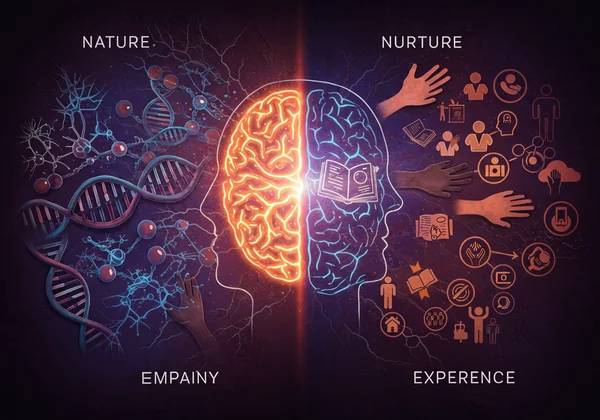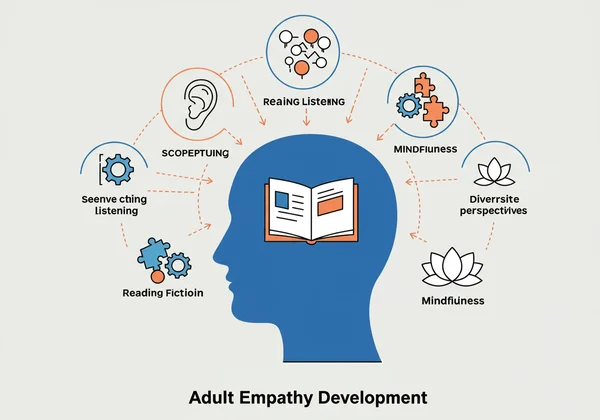Empathy Test: Are We Born Empathetic? Science & Development
September 2, 2025 | By Penelope Dean
Have you ever wondered where empathy comes from? When you see a friend in distress and feel a pang of their sadness, or watch a triumphant movie scene and feel a surge of their joy, is that an innate reaction or a learned response? This question lies at the heart of the nature versus nurture debate, a cornerstone of psychology. The journey of empathy development is a fascinating exploration into our biological wiring and life experiences. So, are we born empathetic?
It's not a simple 'yes' or 'no': we're born with the inherent capacity for empathy, but our experiences are what truly shape and cultivate it. Understanding this interplay is the first step toward self-awareness and personal growth. It allows us to appreciate our natural tendencies while recognizing our power to change. If you're curious about your own empathetic profile, a comprehensive online empathy test can provide a fantastic starting point for this journey.

The Nature of Empathy: Are We Hardwired to Connect?
The science of empathy suggests that humans have a biological foundation for understanding and sharing the feelings of others. From our genetic code to specialized brain cells, nature provides the essential building blocks for connection. This innate capacity is a testament to our evolution as social creatures who thrive on cooperation and mutual understanding.
Genes & Predispositions: Inherited Tendencies
Research, including studies on twins, has shown that genetics play a significant role in our empathetic capacity. Some individuals may have a genetic predisposition that makes them more sensitive to emotional cues from birth. This can influence their temperament, making them naturally more attuned to the feelings of those around them.
These inherited tendencies don't define our destiny but rather set our starting point. Think of it as having a natural aptitude for a musical instrument; you might have a good ear, but practice and training are what turn that potential into skill. Our genes provide the initial empathetic framework, which is then built upon throughout our lives.
Mirror Neurons & the Empathetic Brain
One of the most exciting discoveries in neuroscience is the "mirror neuron system." These remarkable brain cells fire not only when we perform an action but also when we observe someone else performing that same action. When you wince after seeing someone trip, that's your mirror neurons at work, creating an internal simulation of their experience.
This empathetic brain mechanism is fundamental to our ability to understand intentions, share emotions, and learn through imitation. It's the neurological bridge that connects our inner world with that of others, allowing us to feel with them, not just for them. This system is a core component of both cognitive and emotional empathy.

Nurturing Empathy: How Experiences Shape Our Capacity
While biology gives us the potential, our environment is where empathy development truly flourishes or falters. The experiences we have, the relationships we form, and the lessons we learn are powerful forces in shaping our ability to connect with others. Nurture is the chisel that sculpts our innate empathetic clay.
Early Childhood: Attachment & Social Learning's Role
The foundations of empathy are laid in early childhood. The quality of attachment between an infant and their primary caregivers is crucial. When caregivers respond sensitively to a child's needs, they model empathy and create a secure base from which the child can learn to understand their own and others' emotions.
This is where social learning's role becomes paramount. Children are keen observers, learning empathy by watching and imitating their parents, siblings, and peers. When they see others being kind, sharing, and offering comfort, they internalize these behaviors as social norms, contributing to their own child empathy.

The Impact of Environment: Family, Culture, & Education
As we grow, our environment expands, and so do the influences on our empathy. Family dynamics, cultural values, and formal education all play a part. Some cultures may emphasize collective well-being and emotional expression, fostering a high degree of empathy, while others might prioritize individualism.
Schools also play a vital role by teaching social-emotional skills, encouraging perspective-taking through literature, and creating inclusive communities. A supportive environment that values emotional intelligence helps reinforce and expand the empathetic lessons learned at home. Before diving into growth, it's helpful to see where you stand with an empathy quotient test.
The Dynamic Interplay: Nature, Nurture, & Lifelong Growth
Empathy is not a fixed trait determined solely by our genes or our upbringing. Instead, it is the product of a continuous, dynamic interplay between nature and nurture. Our innate predispositions are constantly interacting with our new experiences, relationships, and conscious efforts to grow.
This means that our capacity for empathy can change and evolve throughout our lives. It is not something you either have or you don't; it's more like a muscle that can be strengthened with intentional practice. Recognizing this gives us the power to actively cultivate a more empathetic mindset at any age. Taking an am I an empath test can be an enlightening first step.
Can We Develop More Empathy as Adults? Strategies for Growth
Indeed, the brain's remarkable ability to change and adapt—known as neuroplasticity—means we can always enhance our empathetic skills. The journey begins with self-awareness—understanding your current strengths and challenges. From there, you can adopt specific strategies for lifelong growth.

Some effective practices include:
- Active Listening: Focus completely on what someone is saying without planning your response. Pay attention to their words, tone, and body language.
- Reading Fiction: Immersing yourself in the lives of fictional characters has been proven to improve theory of mind, a key aspect of cognitive empathy.
- Seek Diverse Perspectives: Step out of your comfort zone. Engage with people from different backgrounds and cultures to broaden your understanding of the human experience.
- Practice Mindfulness: By becoming more aware of your own emotions, you become better equipped to recognize them in others.
Your Empathy Journey: Understanding, Assessing, & Growing
So, are we born empathetic? It turns out we arrive with the seed of empathy, and our lives provide the fertile ground and nurturing experiences for it to grow. Both our innate biology and our lived experiences are essential threads in the rich tapestry of our ability to connect.
Understanding this dual foundation is empowering. It frees us from the idea that our empathy level is fixed and opens the door to conscious improvement. The first step on any journey of growth is knowing your starting point. By understanding your unique empathetic profile, you can identify areas for development and begin building stronger, more meaningful connections in every aspect of your life. Ready to begin? Test your empathy today and discover your unique score.
Frequently Asked Questions About Empathy Development
Are empaths truly born or are they made through experiences?
The consensus in psychology is that it's a combination of both. People are born with a genetic predisposition for empathy, but this potential is significantly shaped and developed through life experiences, particularly early childhood relationships, education, and cultural influences.
What are the primary types of empathy recognized by psychologists?
Psychologists generally recognize three main types of empathy:
- Cognitive Empathy: The ability to intellectually understand another person's perspective or mental state.
- Emotional Empathy: The capacity to feel or share another person's emotions.
- Compassionate Empathy (or Empathic Concern): This goes a step further, moving from feeling and understanding to being motivated to help.
How can someone assess their own level of empathy?
Self-reflection is a good start, but a structured assessment provides more objective insights. An online tool, like a scientifically-grounded empathy test, is an effective way to measure different facets of your empathy. It can give you a baseline score and highlight specific areas of strength and potential growth. You can take a free quiz to get started.
What are common factors that can inhibit or reduce empathy?
Several factors can block our ability to feel empathy. High levels of stress, burnout, trauma, and certain mental health conditions can diminish our emotional resources. Additionally, strong biases, prejudice, and a lack of exposure to different perspectives can create barriers to understanding and connecting with others who are different from us.